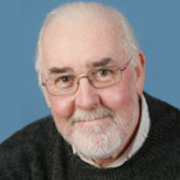
Mike Horton
Michael Horton has edited television programmes, 100s of commercials and 25-plus feature-length films. Along the way he has won NZ Film Awards for big screen classics Once Were Warriors, The End of the Golden Weather and The Quiet Earth (one of many collaborations with director Geoff Murphy).
Horton grew up in Wellington, and in the mid-60s began working as an editor at the NZ Broadcasting Corporation. There he worked on both documentary and drama, including historical tale The Killing of Kane (1971), which was a little of both. This re-enactment of an attack by Chief Titokowaru marked the first local TV drama shot in colour.
In 1975 Horton was one of a group of rising talents to work on kidult series The Games Affair. Over the next few years he edited Fred Dagg classic Dagg Day Afternoon, worked with Sam Neill on documentary Surf Sail, and in 1979 made his feature-length debut, on an adaptation of Roger Hall's classic play about a mid-life crisis, Middle Age Spread. The print for the film was created in Australia; there were some moments of stress when the print arrived in Auckland for the premiere, and was one stop too dark.
In the 80s, Kiwi cinema finally reached flight altitude, and Horton's name seemed to be on many of the best films emerging. From 1980 to 1985 he edited 11 features — plus TV movie Iris, whose film within a film structure presented its own challenges (he also found time to to visit Hollywood after being awarded a 20th Century Fox Film Fellowship). Horton had worked with many of the directors before, including Roger Donaldson, for whom he edited 1981 classic Smash Palace and the After the Depression episode of pioneering TV drama Winners & Losers. But the key collaboration for Horton was arguably with Geoff Murphy, who had co-directed Dagg Day Afternoon.
In 1980 Murphy and Horton rushed to ready a little movie for Cannes that would sell to 20 countries there, and become the first bonafide local blockbuster: Goodbye Pork Pie. The two worked together on two eclectic and ambitious follow-ups, Utu (and later its redux version) and The Quiet Earth. 20 years later, after an extended Hollywood sojourn by Murphy, they collaborated again for Murphy's 2004 thriller Spooked.
The decade following The Quiet Earth saw Horton alternating feature films (the under-rated Starlight Hotel, co-editing the Footrot Flats movie, and a rare American-shot project, Zandalee) with occasional television work, including Alexander Graham Bell mini-series The Sound and the Silence.
Horton won editing awards for two films from this period: acclaimed rite of passage movie The End of the Golden Weather, a long-time dream project for Ian Mune, and Once Were Warriors. Amongst the many reviewers won over by Warriors' defiantly in your face approach, Variety reviewer David Stratton praised Horton's contribution. Horton argues that the film was made on a tight budget, meaning there was less footage than normal to work with. Horton would also edit well-regarded sequel What Becomes of the Broken Hearted?
As Warriors began screening around the globe, Horton was busy on another challenging and sometimes contentious gig: helping condense the history of New Zealand cinema into 56 minutes, for centenary doco Cinema of Unease. The same year Horton worked for the first time with directors Peter Jackson and Costa Botes, as they crafted a more satirical view of Kiwi film history: Forgotten Silver. Horton co-edited the project, alongside Jackson regular Eric De Beus.
Horton must have done okay, because he was later called back for his most high profile project to date: Peter Jackson's The Two Towers, arguably the most structurally challenging episode of the Lord of the Rings trilogy. Working with assistant Jabez Olssen, Horton laboured over a three year period on a three-hour long cut which featured epic battle scenes and a CGI character (Gollum) whose performance was still being perfected during the edit.
Horton (and sometimes Olssen) would be nominated for many editing awards, including a Bafta, an Oscar and an Eddie from the American Cinema Editors organisation.
Since his time in Middle Earth, Horton has edited local hit Second Hand Wedding, relationship drama Separation City, and Cannes-acclaimed short Run. Wedding was directed by Paul Murphy — son of Geoff Murphy, who Horton began working with more than 30 years before. He also reunited with director Lee Tamahori on Mahana, in an effort which would have him share the 2017 New Zealand Film Award for Best Editing with co-editor Jonno Woodford-Robinson.
Sources include
'Mike Horton: Legendary film editor' (Video Interview) NZ On Screen website. Interview by Andrew Whiteside. Accessed 2 February 2016. Loaded 2 February 2016
David Stratton, 'Review: Once Were Warriors' - Variety, 30 May 1994
Goodbye Pork Pie press kit